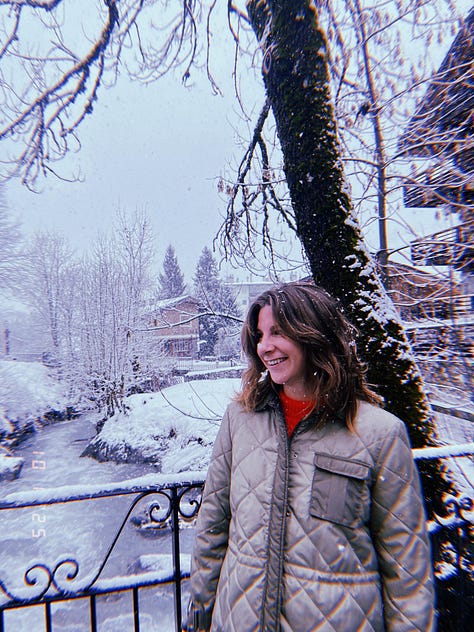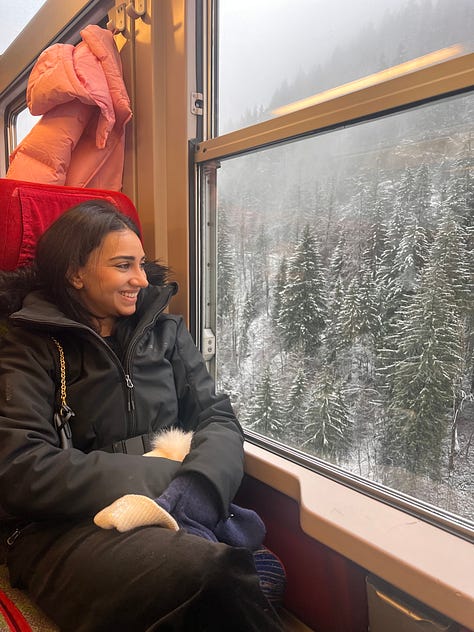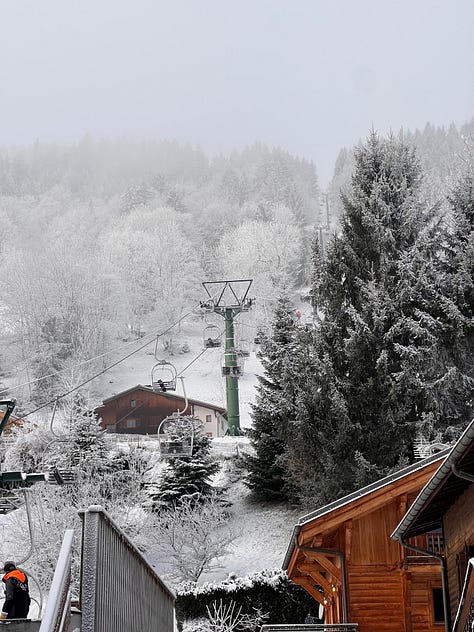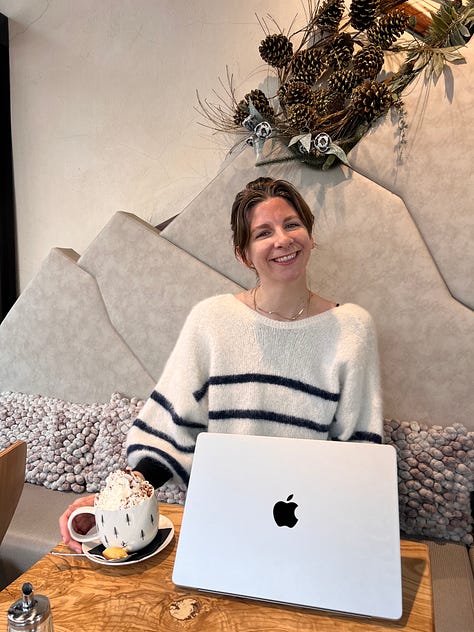Heya friends, happy Friday!
I am heart warmed this week by videos across the internet of Palestinian children learning that a ceasefire has been agreed to. The people of Palestine have endured 467 days of genocide straight, notwithstanding the decades of violence that preceded. There is much more work to be done, but for now, I sigh a (small) sigh of relief for the children of Palestine and hope for their future.
I am still in the french alps yolo-ing my life away. This week’s podcast edition will include thoughts / reflections on recently taking the train into Chamonix (bits n bobs includes some photos below!)—in addition to a fun story about hiking up the ski hill (I don’t ski) to join folie deuce (essentially a club on the mountain slope), only for my friend and I to get immediately rejected by the bouncer. Hope you can listen in! It involves a gondola télécabin ride which keeps it transportation related.
And finally, shout out to subscriber Kanika for winning the coffee shop gift card for filling in my newsletter survey (and thank you to everybody who responded!!). I think I might share a readout of what I learned in a ✨ special edition✨ of the newsletter. But for now, onto ze news:
When design isn’t enough to keep streets safe
Disclaimer: I disagree with this article on multiple levels, but also believe in sharing articles I disagree with so you too can make informed opinions!! The Atlantic deep dives into the idea that better street design alone does not make city streets safer, and there is a role for law enforcement (aka cops) to play. The article touches on the fact that cops over target Black communities when conducting traffic stops, but still believe that cops play a role in community oversight. They reference countries like Sweden that used law enforcement to reduce traffic fatalities. They do not include the fact that Sweden’s Black population makes up less than 1% of the population today. In America that figure is closer to 15%.
The early results of NYC’s congestion pricing
With less than two weeks of implementation, NYC’s congestion pricing seems to be … working. Photos of the city have traversed (my) social media feeds and group chats (shout out to the millennial bike bus group). It’s too early to tell if the drop in traffic will remain at this level, but one thing we can know for sure: the revenue that comes for this program will allow NYC to make needed investments in their transit network that will help to further alleviate congestion in the city. Hurrah. You can read their full week one recap here!
What happens when there are fewer parking spaces to park in?
The NYTs explore why cities are changing their parking requirements. They start off strong with this: “Two billion parking spots dot the [USA], by some estimates. That’s roughly seven spaces for every car, adding up to an area about the size of West Virginia.” The article is full of trade-offs, but an interesting read nonetheless.
WeRide launches in Switzerland
Two of WeRide, a Chinese startups, Level 4 vehicles have made their way to Switzerland, found in the Furttal region. WeRide has plans to expand to a total of eight vehicles, including minibuses, by 2026.
Oxa to provide autonomous bus services in Sunderland
The Sunderland Advanced Mobility Shuttle (SAMS) is partnering with the UK startup Oxa (formerly Oxbotica) as its autonomy provider for a bus service beginning this year. The project aims to show “how autonomous passenger shuttles can better connect people to key destinations within the city while reducing environmental impact.” I hate to point the obvious (I actually love to point the obvious), but simply investing in a well resourced public transit network would reap the same benefits. Not rocket science.
Masdar City begins testing AVs
Masdar City, a new ~innovative~ smart city in the UAE has begun testing AVs (a right of passage for any ~innovative~ smart city). The city has a population of 5,000 people. Masdar City was built by Masdar, a subsidiary of the state-owned Mubadala Investment Company, with the majority of seed capital provided by the Government of Abu Dhabi.
Aurora is pushing back against AV trucking requirements
As I am not a trucking expert, pulling in a quote directly from the article to give you the lay of the land. Aurora is trying to convice the FMCSA and USDOT to remove a requirement for emergency device signaling.
”When [freight] drivers pull over to the side of a highway or shoulder “for a reason other than a necessary traffic stop,” they are required to place warning devices such as reflective triangles or flares behind and in front of the vehicle to alert other drivers. Because autonomous trucks would have no drivers to put out triangles, the industry has to find a way around that requirement.”
What is Transport Adequacy? Quantifying experienced transport poverty in the Netherlands
“It is increasingly recognized that access to transportation options and relevant destinations is not equally distributed across the population, calling for quantitative indicators to identify groups at risk of transport poverty and exclusion. While this has most commonly been done using accessibility measures based on objective land use and transportation data, we argue that subjective self-reported measures of travel options and accessibility are a useful complement, as they are more suited to account for travellers’ perceptions of limitations in the transportation system and outcomes of these limitations, such as limited access to desired destinations and the fulfilment of needs.”
The two competing futures of AVs
“Still, both of these visions [owning AVs vs. ride-hailing] remain broadly plausible, albeit on different unpredictable timelines: autonomous cars as fleet vehicles versus autonomy as a feature in cars that owners mostly keep for themselves. It’s cars as a service versus cars as a strange, new, but semi-familiar, asset class. The two visions aren’t entirely incompatible — Lyft is already talking about building features for users to deploy their own small “fleets” of cars at some point — but with millions of semi-autonomous cars hitting the road, and early generations of fully autonomous vehicles actually driving people around at scale, they’re on course to eventually collide.”
Why AI investors should worry about AVs
A great read this week, which extrapolates how Cruise’s failure can be a mirror of the larger AV industry.
“These predictions [about revenue] turned out to be outlandishly optimistic, relying on questionable data and technical kludges that made the company’s software look more sophisticated than it actually was. Perhaps more unsettling, amid a boom in artificial intelligence technologies that has companies large and small contemplating replacing large numbers of human workers with modified chatbots, Cruise was hardly alone in overpromising.”
Shout out to my friend Rosie who has made a new jobs graphic for the newsletter <3. As this is our new job board (!), I would be remiss to not include a link to her portfolio and a bit about her here. Rosie works in illustration, branding, and editorial production. Her and I met during our masters in city design, and she has a background in environmental sciences. Not only is she a design whiz, she also understands the intricacies of urban projects inside and out. Beyond that, she has the cutest dog (shout out to Una), cooks fantastic vegan meals, and has a very calming presence. I am lucky I get to call her my friend, and would recommend her work 20 out of 10 times.
Secondly, I want to split the job board section into two sections: internships and full-time positions. I am so happy there are some fresh, young(er) minds subscribed to the newsletter, and as somebody who benefitted immensely from (good) summer internship experiences, I want to make sure there’s an effort to not just focus on post-graduation opportunities. All internships posted will be paid, because fuck unpaid labour as a concept and a practice!! Please send jobs my way if you are hiring!!
Internships:
[London, UK - TfL] Women in Buses and Coach Summer Internship
Literally would have died for this job when I was an undergrad student.
[San Francisco, CA - SFMTA] Planning Intern (Level 1)
Note: cities are typically great about hiring (paid) summer interns. I did one working on composting strategy during my undergrad and let’s just say my mom is now a professional composter in her own right.
[Vancouver, BC - UBC + CoV] Sustainability Scholars Programme
I think it’s bullshit this is only open to grad students, but I digress.
Full-time jobs:
[Washington, DC - Urban Institute] Vice President, Grants & Contracts
[San Francisco, CA - Swiftly] Senior Account Manager
[Boston, MA - Zipcar] Manager, Engagement & Retention Marketing






This week the Alps team have started to watch Shogun, which despite it’s violence and award-winning plot, I still routinely fall asleep during. But everybody else in the chalet is loving it.
I am currently reading brotherless night, following a family during the Sri Lanken civil wars is breathtaking and some of the best writing I have encountered in a long time. It is heartbreaking, and I find myself reading over sentences that seem to perfectly capture the grief. I’m not even done reading it, but it’s already getting a recco from me.
My friend Jai, pictured above in blue, is my latest newsletter subscriber. So shout out to Jai for both subscribing and making me omelettes most mornings this week. <333333
That’s all from me. Have a beautiful weekend friends.
Sarah
If you’d like to support my work and this newsletter, please consider becoming a member of the San Francisco Bicycle Coalition or making a donation.










